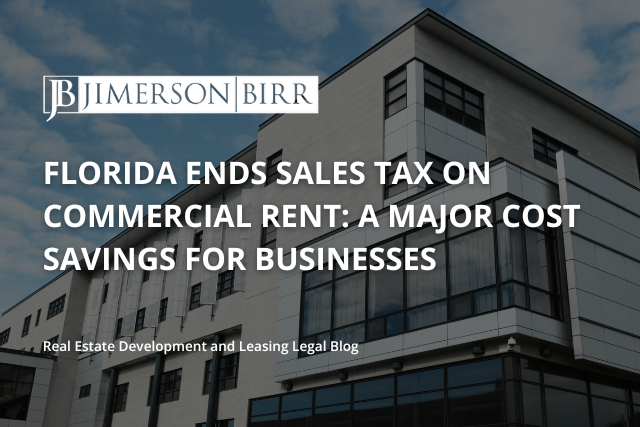Commercial Rent Tax Repeal
Florida’s longstanding commercial rent tax will officially end on October 1, 2025, under the state’s 2025 tax package signed into law by Governor Ron DeSantis. For decades, Florida was the only state to impose a state-level sales tax on the rental of commercial real property, such as offices, retail space, and warehouses. This repeal represents a significant shift in Florida’s business tax landscape and will reduce occupancy costs for thousands of businesses statewide. The change applies to leases for commercial real property that begin or are in effect on or after October 1, 2025. It eliminates both the state-level 2-percent tax and any applicable local discretionary surtax, effectively removing the sales tax burden on commercial lease payments moving forward.
Implications for Existing and New Leases
The repeal applies prospectively, meaning that any rent attributable to occupancy periods prior to October 1, 2025, remains subject to the current sales tax rules, even if payment is made after that date. Businesses and landlords should therefore clearly identify and separate rent charges covering pre-repeal periods to avoid audit issues or misapplication of the tax. After October 1, lease payments will no longer require sales tax collection or remittance, which may simplify invoicing, bookkeeping, and tax filings. The repeal does not affect other types of taxable rentals, such as self-storage units, parking spaces, or short-term accommodations.
Impact on Florida Businesses
The elimination of the commercial rent tax is a substantial cost savings for businesses that lease their space. For example, a tenant paying $10,000 per month in rent could see a reduction of more than $2,400 annually based on the former 2 percent rate. This savings may help offset other rising business costs and can be reinvested in hiring, expansion, or capital improvements. It also improves Florida’s competitiveness compared to other states by eliminating a tax that was often viewed as a deterrent to business relocation or expansion within the state. Landlords may also benefit from simpler lease administration. Lower occupancy costs could improve tenant retention, as occupancy costs become more predictable and manageable.
Businesses should begin planning now for the change. Landlords may want to revise lease templates to remove sales tax language effective for periods after October 1, 2025, and both parties should consult with legal or tax counsel to ensure compliance during the transition period. As Florida continues to position itself as a pro-business state, the repeal of the commercial rent tax removes one of the last remaining structural disadvantages in its tax code and signals a strong commitment to economic growth. With the repeal taking effect in just a few months, now is the time to review leases and adjust for the change. Contact Jimerson Birr to ensure your lease agreements and tax compliance are fully updated for October 1, 2025.

